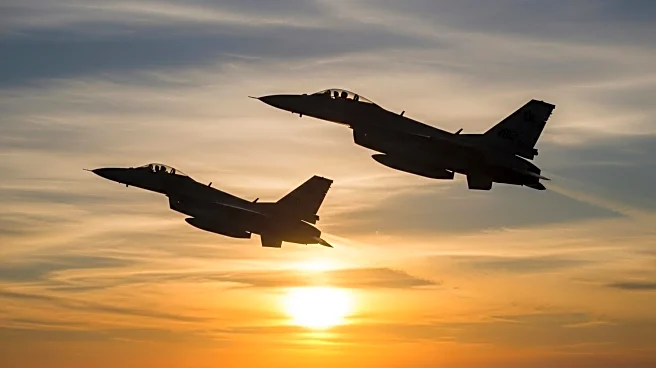What is the story about?
What's Happening?
Japan has initiated a significant military deployment under Operation 'Atlantic Eagles,' sending fighter jets to NATO bases in the United States, Canada, the United Kingdom, and Germany. This operation involves approximately 180 personnel and eight aircraft, including four F-15 fighter jets from the Japan Air Self-Defense Force, two C-2 transporters, and aerial refueling tankers KC-767 and KC-46A. The deployment, running from September 14 to October 1, aims to strengthen defense ties with NATO allies, acknowledging the interconnected security concerns of the Euro-Atlantic and Indo-Pacific regions. This move was announced during a bilateral Defense Ministerial Meeting between British Defense Minister John Healey and Japanese counterpart Gen Nakatani in Tokyo. The operation has already completed stops in the U.S. and Canada, with further visits planned in Europe.
Why It's Important?
This deployment marks a significant shift in Japan's defense posture, moving away from its postwar pacifist stance towards a more active role in global security. By participating in NATO drills and establishing its first mission to the alliance, Japan is signaling its commitment to collective security efforts. The operation also reflects Japan's strategic concerns over the Ukraine conflict's potential impact on Asia, particularly with Russia's alliances with North Korea, Iran, and China. This development could enhance Japan's military capabilities and readiness, potentially influencing regional power dynamics and contributing to global peace and stability.
What's Next?
Japan's continued participation in joint military exercises with U.S. forces, including the unveiling of the Typhon missile system, indicates ongoing military collaboration and capability enhancement. This could lead to further integration of Japan into NATO activities and increased military presence in strategic regions. The deployment may also prompt reactions from neighboring countries, particularly China, which has already criticized Japan's military exercises. Future diplomatic engagements and defense strategies will likely focus on balancing regional security concerns with international cooperation.
Beyond the Headlines
Japan's military engagement with NATO highlights a broader geopolitical shift, as countries reassess alliances and defense strategies in response to global security challenges. This move could influence other nations in the Indo-Pacific region to reconsider their defense policies and alliances. Additionally, Japan's actions may prompt discussions on the ethical implications of military expansion and the balance between national security and regional stability.
















